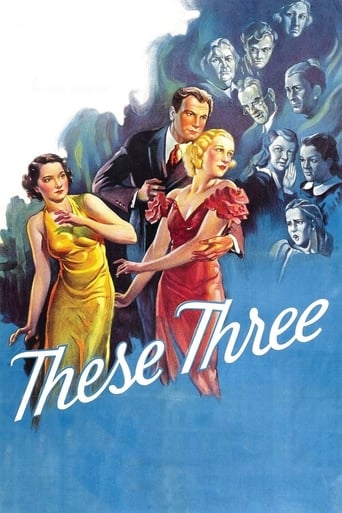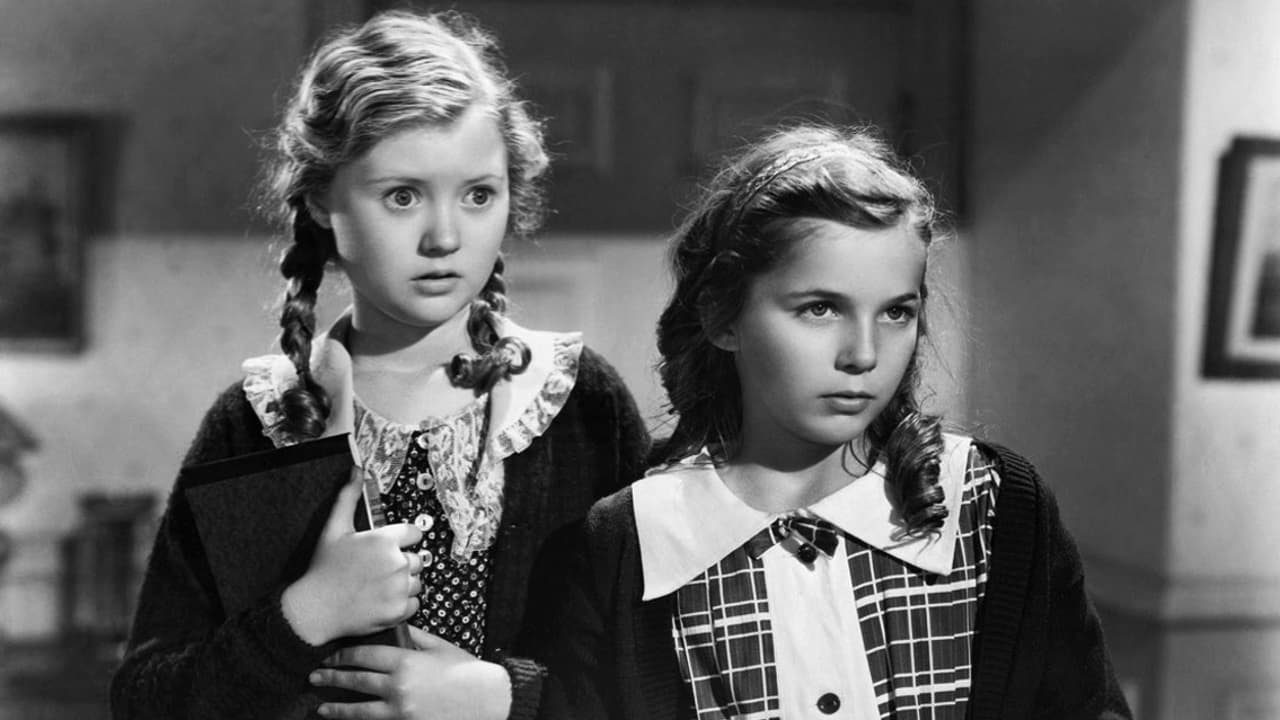Hunter Lanier
The relationship between censorship and creativity can be summed up no better than in "The Producers," when Gene Wilder is going insane and Zero Mostel throws the bucket of water on Wilder to calm him down, only to make Wilder more insane. "These Three," based on a play by Lillian Hellman (who also wrote the screenplay), is the story of two debutantes, Karen Wright and Martha Dobie, (Merle Oberon and Miriam Hopkins) fresh out of school who--almost immediately--inexplicably decide to start their own school (studies do say the public school system is built to churn out teachers). At the building where the two women wish to house their school, they meet Joe Cardin (Joel McCrea) who assists them in their endeavor. He makes three. They all become great friends, open the school to resounding success and everything is just hunky-dory.As usually happens, children ruin everything--in this case, one child: Mary (Bonita Granville). To understand Mary, one must simply imagine Iago as a young girl--afraid? Mary, because she's spiteful, young and doesn't understand consequences, spreads a lie about her teachers in order to take the attention away from her own misbehavior. So what is initially a private, mild, unacted-on love triangle--that probably would never have amounted to anything and fizzled away with time--becomes the business of the entire town.The original play had Mary's lie alluding to a lesbian relationship between the two friends; however, due to that pesky Hays Code, McCrea's character was conceived, and the lie turned into one of heterosexual deviance, though even that is tiptoed around. Despite the changes to the source material, the film never feels watered down, as the contents of the lie really aren't that important, at least not as much as the subsequent reverberations. Plus, by not mentioning specifics, it almost makes the whole thing more potent, as the viewer's imagination is given free rein. The example often referred to in is from "Shane," and the intense sexual tension between the titular character and the boy's mother, despite never showing anything. In this way, censorship becomes creativity's unlikely accomplice. As weighty as the film is, it's surprisingly funny. In particular, Martha's aunt, Lily Mortar, (Catherine Doucet), who is a haughty, loquacious, former actress. She reminded me of one of Dickens' over- the-top aristocratic characters. When a taxi driver (played by Walter Brennan, who, I guess, got tired of driving stagecoaches) requests his pay, Mortar merely chides him on his obsession with money.William Wyler's "These Three" is an excellent adult drama that hasn't aged a bit (well, maybe a little bit). Not a single performance fails to impress--particular Granville's as Mary, a tough part for a child actor--and the comedy--which is a gamble in a dramatic film, for it runs the risk of deflating the whole thing-- feels completely natural. Few films I've seen handle the concept of mob mentality better than this one. My one gripe--and I had this with the recent "The Hunt"--is who are these adults that take everything a child says as indisputable fact? Use your brain.Lastly, how cool is that poster?
Claudio Carvalho
Karen Wright (Merle Oberon) and Martha Dobie (Miriam Hopkins) are best friends since college. When they graduate, they decide to move to Lancet to the farm that Karen has inherited from her grandmother to build a boarding school for girls. On the arrival, they meet Dr. Joseph Cardin (Joel McCrea) and he helps them to restore the farmhouse working hard. One day Karen meets the influent Mrs. Amelia Tilford (Alma Kruger) that helps them to get students including her spoiled granddaughter Mary Tilford (Bonita Granville). Out of the blue, Martha's arrogant aunt Lily Mortar (Catharine Doucet) arrives at the school and offers to give classes. Meanwhile Joseph proposes Karen and they are engaged to each other.When the spiteful and compulsive liar Mary, who is a bad influence to the other girls, is punished by Karen after telling a lie, Martha has an argument with her snoopy aunt Lily in another room. Lily accuses Martha of being in love with Joseph and having encountered him in her room. Mary's roommate Rosalie Wells (Marcia Mae Jones) overhears the argument and tells Mary what Mrs. Mortar had said about her niece. The malicious Mary accuses Martha of being the lover of Joseph to her grandmother and Amelia spreads the gossip to the parents of the students that withdraw them from the school. Karen and Martha lose a lawsuit against Amelia and have their lives disrupted with the scandal. Further, Karen calls off her engagement with Joe since she is not sure that he is telling the truth. "These Three" is a cruel and heartbreaking story that shows how destructive the power of a lie may be. William Wyler is among my favorite directors and this film is a little gem with a magnificent screenplay. In 1961, he remade this movie changing the title to "The Children's Hour" and using the theme of lesbianism instead of a triangle of love, and a tragic ending. Both movies are worthwhile watching and it is hard to pointy out which version is the better. My vote is eight.Title (Brazil): "Infâmia 1936" ("Infamy 1936")
lugonian
THESE THREE (Samuel Goldwyn/United Artists, 1936), directed by William Wyler, based on "The Children's Hour" (1934) by Lillian Hellman, who also scripted the original story and screenplay, is a powerful drama expertly transferred to the screen with a timely message on how a spiteful teenager's lies can virtually destroy the lives and reputations of innocent people. Being more like something commonly depicted in 1950s cinema such as THE BAD SEED (1956) for example, THESE THREE can be categorized as ahead of its time.The story revolves around best friends Martha Dobie (Miriam Hopkins) and Karen Wright (Merle Oberon), first presented as classmates graduating from college. While Karen has no living relatives, Martha has her meddlesome aunt, Lily Mortar (Catherine Doucet), a former actress who theatrical manner gets on her nerves. Following their ceremony, the girls decide to work together as teachers by forming their very own school. Taking an old abandoned farm house in Lancet, Massachusetts, Karen has inherited by her late grandmother, they, with the help of Joseph Cardin (Joel McCrea), their neighboring doctor, beekeeper and handyman, help turn a run down building into an established Wright and Dolbie School. The teachers successfully acquire the much needed students to get themselves established. All goes well until Mary Tilford (Bonita Granville), a mischievous child of a rich aunt (Alma Kruger) creates trouble for those around her. Aside from stealing a bracelet belonging to Helen Burton (Mary Louise Cooper) and placing the blame on the innocent Rosalie Welles (Marcia Mae Jones), she fakes heart attacks so not to be punished for her actions, though both Karen and Martha through her as a compulsive lier who needs help and strict discipline. Hearing rumors involving "these three" are enough for Mary to avenge herself on them by stretching the truth out of proportion to her aunt, forcing Rosalie to back up her statements. With Martha and Karen finding their pupils being taken out of school, and the doctor losing his position in the hospital, "these three" join forces in a courtroom battle, to only find their lives and reputations ruined beyond repair.While the screen adaptation substitutes a romantic triangle over its original premise of Martha and Karen as suspected lesbians from the stage play, the film retains its powerful impact thanks to William Wyler's direction. When Wyler directed its remake, THE CHILDREN'S HOUR (1961) starring Audrey Hepburn, Shirley MacLaine and James Garner (along with Miriam Hopkins in the Doucet role), the story was not only brought up to date, but the lesbian theme retained. Comparing both versions, the original is no doubt the best of these two. Although the remake is well acted by the leading players, THE CHILDREN'S HOUR comes off as dreary, depressing and weakened by the lackluster performances by the children, especially Karen Balkin whose tantrums and outbursts can't parallel towards Granville's Academy Award nominated (supporting category) performance as the spiteful Mary Tilford. Before Granville played the lovable teenage sleuth Nancy Drew in four installments for Warner Brothers (1938-39), and other notable roles through her adulthood, she did a similar Mary Tilford portrayal in MAID OF SALEM (Paramount, 1937) as a vengeful girl whose spiteful lies lead to a Salem witch hunt. She proves herself a fine, intense young actress, especially when her motionless eyes show no remorse for her actions.Considering Hopkins and Oberon as possible contenders as Academy Award nominees, Hopkins is most notable as the stronger of the two due to her forceful performance. Aside from keeping her emotions to herself over the man she loves, her heated arguments with her aunt, after refusing to testify for her in court, are realistically done. It seems interesting how the script constantly substitutes "Be still" for either "Be quiet" or "Shut up!" While Hopkins, Oberon and McCrea are the only actors with their names presented in the opening credits, the supporting players, consisting of Walter Brennan who provides the film's lighter moments as a taxi driver who charges a dollar a mile; and Margaret Hamilton as Agatha, the Tilford Maid, in a brief but striking performance with the unruly child, are given the credit they deserve along with other members of the cast. The closing credits does not exist in the old 1986 VHS recording, though available in TV prints. Aside from presentations on commercial TV prior to 1990s, THESE THREE did have exposure on cable television throughout the years, ranging from Turner Network Television (1991-92); American Movie Classics (1992-1993); and Turner Classic Movies (2003-2005).In closing, THESE THREE is another great movie from the Samuel Goldwyn archives. Nothing in this 93 minute presentation drags and no scenes unnecessary. (****)
sugar-bear
This movie was awesome!!! A spoiled brat named Mary is nothing but badness. She torments her friends and spreads an ugly rumor about her teachers. Now the school has shut down and the teachers face some hefty fines all because of this nasty little rich girl. The ending is what took my breath away most of all. Margaret Hamilton(The Wicked Witch of the West in The Wizard of Oz)plays the little girl's grandmother's maid. When the grandmother realizes Mary has been lying all along she tells the maid(Hamilton) to send her up to her room. The little brat gets feisty with the maid, or at least TRYS to, and regrets it. Hamilton delivers one of the worlds most painful face slaps in the history of film. When she slapped Mary I couldn't help but cringe. There was NO sound effect and there was NOTHING fake about that face slap. It was genuine and REAL!! Another reason no one should ever mess with that woman. Even Dorothy knew she couldn't mess with her. But this movie was great. The young girl who plays Mary does an excellent job and I must say deserved an award. She was really convincing in her role and so was everyone else.


 AD
AD



